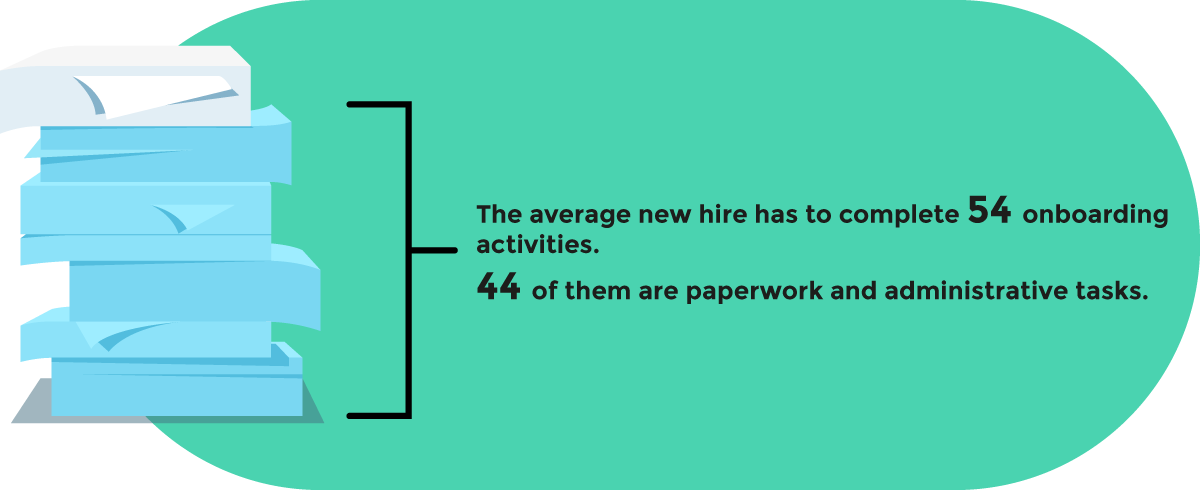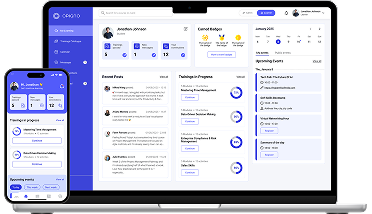New hire onboarding affects how successful and durable the employment relationship will be.
In fact, Digiday's 2018 survey showed that employees with a negative new hire onboarding experience are twice as likely to look for new opportunities soon.
Considering the deepening workforce shortage, the struggles of companies trying to close the skills gap, and the fact that the average US employer in 2019 would spend $4000 and 24 days to hire a new worker, it's in the company's best interest to make a great first impression so that the new hire doesn't quit in a month.
So, let's break down the ways and the extent to which onboarding benefits the company and how modern e-learning tools can take your onboarding processes to a higher level.
The benefits of onboarding for an employee
The ultimate goal of onboarding is to integrate a new hire into the working process swiftly and smoothly, so for an employee, proper onboarding does the following:
Reduces stress and provides much-needed support
Changing workplaces is stressful and overwhelming. A new hire must do lots of paperwork, learn large volumes of information about the company, its rules and processes, its products, meet team members, etc.

A structured process with clear steps to follow drastically reduces the stress of the first days in the new workplace, making them exciting instead.
Fosters social integration and a sense of belonging
The onboarding program creates opportunities for new hires to connect with their colleagues, learn their personalities and work styles, and establish meaningful relationships. Social connections help new hires feel welcomed and supported and set the stage for better teamwork and collaboration.
Shortens the learning curve and enhances acclimatization
By introducing key and unique company systems, workflows, technologies, and expectations and offering opportunities for hands-on experience, onboarding helps new hires understand their responsibilities.
Boosts self-efficacy and intrinsic motivation
Feeling competent in one's role — self-efficacy — is a key driver of motivation. With a positive onboarding experience, new hires feel supported and equipped with the necessary knowledge and skills and approach their work with confidence and a sense of ownership.
Helps to align personal and company values
Effective onboarding provides insights into the company's mission, culture, and values so new hires can assess whether these match their personal values early on. Thus, onboarding helps ensure a new hire is a harmonious fit within the company, contributing to a more fulfilling and purpose-driven work experience.
In short, a well-structured onboarding process not only alleviates the initial stress of joining a new workplace but sets the foundation for a positive and productive employee journey. But it's not just about welcoming new hires; it's a strategic investment.
The benefits of onboarding for a company
By prioritizing a comprehensive onboarding process, businesses can enjoy a multitude of benefits that significantly impact their overall success, such as:
Higher employee retention
When employees feel valued from the start, they are more likely to stay with the company in the long run, reducing turnover rates and the costs associated with recruitment and training, so thoughtful onboarding isn't just about getting employees but about keeping them.
Brandon Hall Group found that organizations with a robust onboarding process improve new hire retention by 82% and productivity by over 70%.
Embedding the company culture from the get-go
Onboarding provides a crucial opportunity to instill the company's mission, values, and culture into new hires from their first day, helping them understand how their roles contribute to its overall success.
Setting a consistent training framework
A standardized onboarding process ensures consistent training and support. This consistency helps eliminate knowledge gaps and maintain quality standards across the entire workforce. This is particularly crucial in industries where compliance and adherence to specific protocols are paramount.
Increasing employee engagement
Onboarding sets the tone for the entire employee experience, a critical business performance driver. When new hires feel valued, appreciated, and well-supported, it creates an environment where they are motivated to contribute their best.
McKinsey Employee Experience Survey 2020 shows that "people who report having a positive employee experience have 16 times the engagement level of employees with a negative experience, and that they are eight times more likely to want to stay at a company."
Reaching full productivity faster
Efficient onboarding accelerates the time it takes for employees to become productive contributors and start adding value to the organization.
Human Capital Institute found that invested onboarders get better talent outcomes and are twice as likely to report faster times to proficiency for new hires.
This way, companies can reduce the costs associated with downtime and excessive supervision and maximize the return on investment in human capital.

The challenges of implementing onboarding
If onboarding is so rewarding for both the employees and employers, why are comprehensive onboarding programs still such a rare sight? According to Human Capital Institute, the biggest onboarding challenges are:
- Inconsistent application, especially in large organizations with many varying roles and locations.
- Failing to prioritize and measure the impact of different activities, often reducing the onboarding process to mandatory paperwork, with no regard for long-term goals.
- Lack of accountability, time, and resources when everyone is expected to be welcoming to a new team member, but no one's really responsible, and there's no actionable plan in place.
As a result, only a third of companies have a comprehensive onboarding program, and a measly 12% of employees say their organizations did a good job. However, a learning management system can alleviate all of the mentioned problems.
How you can use an LMS for onboarding
A learning management system can be an indispensable aid for creating a top onboarding experience that is streamlined, scalable, and flexible.
Consistent onboarding with a centralized knowledge hub
An LMS serves as a centralized virtual repository for all onboarding materials, including company policies, procedures, product knowledge, and multimedia training modules.
Having 24/7 access to onboarding materials from anywhere in the world ensures effective and consistent onboarding regardless of location or time zone. This is particularly beneficial for remote workers and global companies that care about preserving their corporate culture and brand integrity.
Additionally, LMS reduces the need for extensive classroom training and physical resources, minimizes administrative burdens, shortens onboarding periods, and, ultimately, saves costs for the organization.
Personalized training for diverse departments
LMS allows organizations to introduce new hires to both general company information and role-specific, personalized training across multiple departments simultaneously, ensuring a well-rounded and efficient orientation.

Automated enrollment and onboarding management
Integration with Human Resource Information Systems (HRIS) and other internal systems automates enrollment and course assignment, eliminating manual data entry (and associated human errors) and ensuring all new hires transition seamlessly from the recruitment phase to onboarding. And LMS features like video conferencing and an internal event calendar allow one to plan, assign, and run events and meetings within one platform in a few clicks.
This automation can free up dozens of hours for HR professionals to focus on more strategic initiatives.
Full visibility for HR and transparent roadmap for new hires
LMS tracking and reporting features provide HR managers with real-time visibility into the onboarding progress of each new hire and early evaluation of their understanding of company policies, procedures, and product knowledge. This allows for proactive engagement, identification of potential roadblocks, and timely intervention if necessary.
Moreover, with LMS tracking capabilities, it is easier to measure the ROI of separate activities, further driving the value of onboarding.
LMS also provides a clear roadmap for new hires that helps them understand expectations, milestones, and the overall trajectory of their integration into the company. This transparency fosters a sense of direction and helps new hires feel confident in their path to success.
Seamless transition to role-based training
Once onboarding is complete, LMS seamlessly transitions new hires to role-based training, providing a smooth progression into their specific job functions — no need to change the platform to continue developing skills and contribute to the company's success.
As you can see, the many ways LMS elevates the onboarding experience make it an invaluable asset. Want to elevate your onboarding experience with an LMS? Contact us today to learn about all the opportunities Opigno has to offer to your organization.
Published on January 18, 2024.
